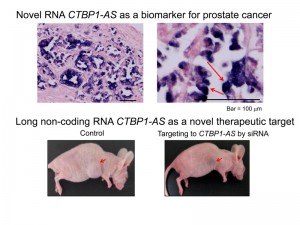Novel RNA as therapeutic target for prostate cancer CTBP1-AS promotes prostate cancer by epigenetic regulation

Prostate cancer is one of the most common forms of cancer, and occurrence and mortality rates are increasing in many developed countries with the graying of society. Androgen has a key role in the development and progression of prostate cancer. Although hormone therapy by blockade of androgen signals is effective for its treatment, the emergence of hormone therapy refractory prostate cancer, or castration-resistant prostate cancer, is a major problem. The androgen signal is reactivated in such cancers, indicating the need to elucidate the molecular mechanism of androgen action in hormone therapy refractory prostate cancer.

© Ken-ichi Takayama., Satoshi Inoue.
(Upper) Detection of CTBP1-AS in prostate cancer clinical samples obtained by radical prostatectomy. Immunostaining for CTBP1-AS was not detected in normal prostate tissues surrounding cancer, whereas strong immunostaining is observed in the nuclei of cancerous regions.
(Lower) Effects of CTBP1-AS knockdown in the in vivo tumor model of hormone refractory prostate cancer. Therapeutic effect of CTBP1-AS siRNA was exhibited.
Prof. Satoshi Inoue of the Department of Anti-Aging Medicine and Dr. Ken-ichi Takayama of the Department of Geriatric Medicine, both in the University of Tokyo Hospital, have identified CTBP1-AS, a long non-coding RNA, which is a novel type of gene that does not encode a protein, as an androgen target. This molecule is the first androgen-regulated non-coding RNA discovered that is potentially useful for prostate cancer therapy. The researchers also discovered that CTBP1-AS has an oncogenic function, promoting cell and tumor growth in the progression of prostate cancer. Moreover, they showed that CTBP1-AS acts by a novel epigenetic molecular mechanism, interacting with the RNA-binding protein PSF to affect global gene expression. Taken together, CTBP1-AS may be a novel therapeutic target for both hormone-dependent and castration-resistant prostate cancer.
This work was supported by Grants of the Cell Innovation Program and P-DIRECT from MEXT and the Advanced Research for Medical Products Mining Program of the NIBIO.
Press release [pdf] (Japanese)
Paper
Takayama KI, Horie-Inoue K, Katayama S, Suzuki T, Tsutsumi S, Ikeda K, Urano T, Fujimura T, Takagi K, Takahashi S, Homma Y, Ouchi Y, Aburatani H, Hayashizaki Y, Inoue S,
“Androgen-responsive long noncoding RNA CTBP1-AS promotes prostate cancer”,
EMBO J 32 (2013): 1665 ? 1680, doi: 10.1038/emboj.2013.99.
Article link
Links
Department of Anti-Aging Medicine, University of Tokyo Hospital (Japanese)
Department of Geriatric Medicine, University of Tokyo Hospital (Japanese)






